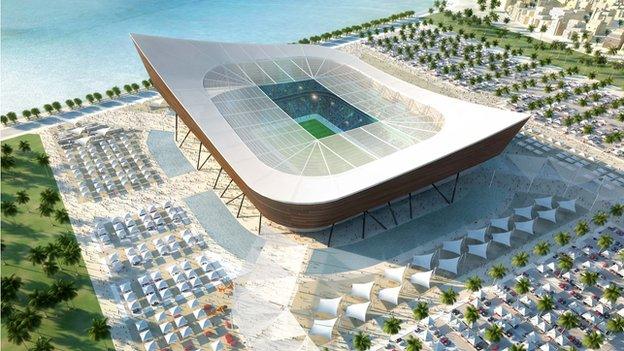Qatar 2022 World Cup: How will it affect English season?
- Published
- comments
Fifa's Jerome Valcke: "We are all making concessions to find the right time to play the 2022 World Cup"
Premier League clubs sent 105 players to the World Cup in Brazil last year, which is a lot of talent for a business in the entertainment sector to do without over the pantomime season.
A Fifa taskforce has recommended the 2022 World Cup take place in winter to avoid Qatar's hot summer temperatures.
It did not mention exact dates, saying only that "end-November/end-December" was the "most viable" period, but an early rumour to emerge from the Qatari conclave is that the governing body is considering 26 November to 23 December, four days shorter than the 32-day tournament in Brazil last year on account of it being staged in a single-city state.
But that is just two days short of Christmas, which even the otherwise supportive Fifa vice-president Jim Boyce admitted might cause officials, players and spectators a few difficulties at airports around the globe.
A finish that close to the Queen's Christmas Speech would also make it unlikely that fans of Premier League football will be able to gorge themselves in the customary manner over the holiday period: there were 30 games from Boxing Day to New Year's Day this season.
Premier League chief executive Richard Scudamore said one of his priorities was to "keep the Christmas and new year programme intact", and this is clearly one of the areas now very much up for debate.
Could, for example, a World Cup final on 18 December, a Sunday and also Qatar's National Day, be a better option for all concerned than the last Friday before Christmas?
It would certainly placate the broadcasters who recently teamed up to hand the Premier League more than £5bn for three years' worth of domestic TV rights. BT and Sky televised 25 live games from 1 December to 1 January this season, and at a current going rate of £10m a game, that's a lot of unscripted drama to replace.
The Premier League TV rights for 2022 have not been sold yet, and anybody bidding for them will clearly be able to price 2022's break into their bid, but keeping that intermission as short as possible will be their main concern, particularly if they are without rights to the big show in Qatar.
Christmas cancelled?
Richard Scudamore: "It's the European leagues that are suffering the most"
It should also be noted that the Football League might be quite excited about the prospect of the Premier League cancelling Christmas. Its 72 clubs could probably live without a similar number of players to the 14 they sent to Brazil, giving them a clear run at home throughout November and December.
The Scottish Premiership, with a similar number of absentees, might also be minded to take a leaf out of club rugby union's book and carry on regardless.
That is not to say those leagues will not be affected by Fifa's decision to do what Stoke City chairman Peter Coates described as "promising one thing", a normal World Cup, and "delivering another", a winter warmer.
England's preparations for the World Cup in Brazil started at a training camp in Portugal three weeks before their first game, and continued with a farewell friendly against Peru at Wembley on 30 May and then two more games in Miami over the following week.
Whoever is tasked with delivering the World Cup win for England in 2022 - something Football Association chairman Greg Dyke has listed as a key performance indicator for the national game - can forget having three weeks to prepare. They will be lucky to get a fortnight.
Scudamore and co will be keen to see if they can trim a few more days off that 28-day tournament estimate, too, although it was interesting to note the comments of the German Football League's managing director Andreas Rettig, who said Fifa must "consider the strain on top players".
"A shorter match schedule cannot mean that the same number of matches must be played in a briefer period of time," he added, which suggests he wants to re-open all manner of debates about the size of the tournament.
But if we take a two-week call-up period and four weeks for the competition itself as a starting point, we are talking about a cessation of hostilities across Europe's big leagues from the first week of November to Christmas.
"It's going to be hugely difficult," said Coates.
"But I think they'll try to get it done in one year, rather than spread it over three years. It's better to have one bad year, when everything is messed up, than three. It's about making the best of a bad lot.
"It will have to be a break. The biggest teams won't want to carry on - they'd be decimated."
What will be affected?
The current Premier League season started on 16 August, 14 weeks after last season finished.
If Coates is right - and the early indications are he is - players can forget their schoolteacher-like holidays that year and make do with a fortnight between the end-of-season do and pre-season.
Qatar's World Cup weather explained
Because it is not just a question of squeezing in six or seven weeks' worth of league fixtures.
The Football League is currently preparing for one of its two big weekends, the League Cup final, with the play-off finals being the other.
Continuing the league programme is one thing, but doing without Premier League clubs in its premier cup competition is unthinkable, which means shunting the whole thing at least a month forward. This season's first round started on 11 August.
The FA Cup will also be affected. Its preliminary round started on 15 August, with rounds one and two taking place in November and December.
OK, the Premier League is not involved at that point, but will the FA want to put its showcase club competition up against its international endeavours?
Whichever dates Fifa settles on, and the Premier League and other leading leagues respond to, one thing is certain: there is going to be an awful lot of summer football that year.
But there is also going to be a lot of winter football, as you simply cannot take six to seven weeks out of the calendar and hope to make it all up during the cricket season.
Take, for example, Uefa's two big club money-spinners, the Champions League and Europa League.
As Scudamore noted, Uefa was quick to welcome Fifa's November-December choice for Qatar, something he considered a bit cheeky given the winter breaks that are currently built into its two club competitions.
But with the qualifying rounds for those tournaments already starting on 1 July, can Uefa really expect clubs to be ready to play in early June? And if so, does this mean the transfer window is open earlier, too?
Possible 2022 timeline |
|---|
Early November: Premier League pauses |
26 November: World Cup starts |
Early December: Group stages finish, half the players return to clubs |
Through December: More players return home after knockout stage exit |
Friday, 23 December: World Cup final |
Monday, 26 December: Premier League returns on Boxing Day? |
Will clubs receive compensation for the interruption?
It is when you consider all of these permutations that you start to wonder whether the man who did the technical reports on the bidding nations for the 2018 and 2022 World Cups, Chile's Harold Mayne-Nicholls, was underestimating things when he said a winter World Cup would have an impact on 50 leagues around the world.
Mayne-Nicholls, of course, completely discounted the prospect of Qatar ever winning the bid.
They did, though, and despite everything we have been through over the past four years since that remarkable decision was announced, it seems Qatar really will get the World Cup it has spent so much money to secure.
Some of that money may now have to be shared, though, as the issue of "compensation" is likely to become an even more contested area in the club versus country debate. However Fifa says it will not pay clubs as they have seven years to prepare.
Scudamore did not answer questions on compensation, but Coates was less squeamish about it.
"Absolutely," was the 77-year-old businessman's succinct reply when asked if Fifa owed the clubs some money for their trouble.
"There could be all sorts of contractual implications and effects on clubs and their incomes that year, so we're more than entitled to expect compensation. We've been misled," he said.
Compensation, however, can take many forms, as was seen when Fifa quietly gave the television networks that broadcast football in North America the rights to the 2026 World Cup without so much as a contest - a magnanimous gesture to companies who might have been peeved that they now have rights to a 2022 tournament that will have to battle with the business end of American football's NFL and college seasons.
Will this benefit England's performance?
Neville - Winter World Cup will help England
Another way of looking at that deal, though, is to say that where there is a will there is a way, and that was certainly the view of former England, Everton and Manchester United utility man Phil Neville.
As well as suggesting that a winter World Cup could actually help a team that traditionally arrives at summer tournaments utterly exhausted, the BBC pundit and Salford City co-owner also sounded a note of cosmopolitan optimism.
"The problem is that we are very traditional in this country," he said.
"We like to have our 10 weeks off in the summer and we like to have our games over Christmas. But I think the game has changed now and we've got to change our views a little bit.
"I remember when we went to America in 1994 and there was a little bit of nervousness going to that country because they weren't really into football, but they put on an amazing World Cup.
"I think Qatar with their wealth will put on a fantastic World Cup."
Perhaps Dyke and Neville are not so crazy, and England can win a World Cup in 2022. As ideas go it is hardly more outlandish than staging the tournament in a small, scorched country that has never qualified for the competition.
- Published25 February 2015
- Published25 February 2015

- Attribution
- Published24 February 2015

- Published24 February 2015